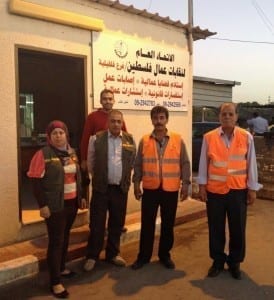Nov 6, 2013

Amed Huber, secretary of Legal Affairs at the Topy Top union, joined a rally in support of Hialpesa textile factory workers. Credit: Gerardo Olortegui, National Federation of Peruvian Textile and Apparel Workers
Peruvian textile workers are standing firm in their demands that a textile company obey a recent Labor Ministry ruling requiring the company to transition workers to permanent job contracts.
Since November 1, members of the Hialpesa Workers’ Union have been reporting to work without signing fixed (short-term) contracts. The Hialpesa textile factory is refusing to allow workers who have not signed a new contract back to their jobs.
In September, Peru’s Ministry of Labor ruled that all 1,008 workers at the Hialpesa textile factory in Lima be transitioned to indefinite term (permanent) contracts that would guarantee job security. Despite the Ministry’s ruling, Hialpesa has conditioned employment by offering workers only fixed-term contracts.
Peru’s complicated export laws have led to the abuse of short-term contracting, which not only severely restricts worker rights but also discourages workers from reporting workplace violations and exercising their rights because they fear their contracts will not be renewed. Although numerous short-term contracts have been renewed over the years, the lack of employment guarantees means workers are unable to plan for the future and adds to their economic vulnerability.
“The union is standing firm and we’re not going to sign any more short-term contracts or deals that fall short of full recognition of our rights,” said Pedro Broncales, general secretary of the Hialpesa Workers’ Union. “The Labor Ministry has issued its resolution. Now it’s time for Hialpesa to respect it.”
The Hialpesa workers’ demands are both legal and with precedent—in September 2013, another Solidarity Center partner, the Union of Workers at Franky and Ricky apparel factory in Arequipa, campaigned successfully for its employer to move 300 workers who were on short-term contracts onto permanent contracts. The Solidarity Center has partnered with members of the Franky and Ricky union on trade union capacity building and labor rights enforcement campaigns since 2011. As a result, the largely female apparel workers now have more employment stability.
Jyrki Raina, general secretary of the global union federation IndustriALL, is urging the ministry to enforce its decision.
Earlier this year, six international apparel companies threw their support behind repeal of a law in Peru that allows employers in the garment and textile export industries to hire workers on consecutive short-term employment contracts.
Nov 4, 2013
November 4, 2013—Indonesian workers are planning a second round of nationwide protests for better wages, likely beginning November 6, according to the Jakarta Labor Forum.
After 3 million workers last week went on a two-day strike across the country, the government raised the minimum wage by between 10 percent and 11 percent, well short of the amount workers are seeking in an economy where inflation is expected to rise by 9 percent next year. Indonesian workers are calling for higher wages to match those of other Asian countries as foreign direct investment flows into the region’s biggest economy. Workers also want an end to job outsourcing.
In an editorial supporting the workers, the Jakarta Post wrote that “workers live in virtual poverty even while the minimum wage is described as a ‘decent standard of living.’”
The editorial quoted Jumisih, a union leader from North Jakarta’s industrial area, who said: “Renting a small space … with several others, with no ventilation in a squalid area is not decent.”
At least 17 workers were attacked during last week’s rallies, according to the Confederation of Indonesian Worker’s Union (KSPI). The union said the workers were hospitalized after receiving wounds from sharp weapons and four are in critical condition. KSPI is calling for an end to such attacks.
Indrasari Tjandraningsih, a labor researcher at AKATIGA, the Center for Social Analysis, maintains that workers’ demands to ban outsourcing are also supported by data on the widespread exploitative and degrading practices.
In an opinion piece in today’s Jakarta Post, he writes: “When workers demand social security they refer to both the Constitution and the law on social security. All these show that workers’ demands are not irrational but have solid grounding. This state of affairs should be understood in a more positive context: Indonesian workers are getting more aware of their rights and also have more capability to see problems in a comprehensive and objective manner.”
Oct 31, 2013
Hundreds of thousands of Indonesian workers started a two-day national strike today demanding the government institute a fair minimum wage, end rampant employer violations of labor outsourcing and speed up implementation of a universal health care law. Several unions conducted rallies over the three days leading up to the national mobilization to increase public awareness of the effort.
Union workers also are calling for passage of a national law protecting domestic worker rights and repeal of a recently passed law widely criticized for its apparent aim to restrict the freedoms of civil society organizations.
Speaking on behalf of a coalition of unions participating in the action, Indonesian Trade Union Confederation president Said Iqbal said,”We have been compelled to take to the streets since the government and employers have been unwilling to seek solutions to these issues with us in good faith.”
Indonesian unions also held a national strike in October 2012, pushing similar demands. Policymakers took swift action to engage labor leaders to find solutions in the days and weeks following that strike. Provincial minimum wages, for example, were increased around the country by an average of 30 percent and a new regulation on labor outsourcing was issued that largely met union demands.
Unions say that last year’s wage increases, although significant, fell well short of a decent wage and that the new labor outsourcing regulation has not yet been implemented.
Oct 30, 2013

Tamam Abdel Hafiz and co-workers at the Qalqilia border, where they talk with Palestinian workers. Credit: Francesca Ricciardone/Solidarity Center
By 4 a.m., Tamam Abdel Hafiz’s colleagues are already at the Qalqilia border crossing, talking with some of the more than 4,000 workers who head for jobs each day from Palestine to Israel and West Bank settlements. Hafiz and three other members of the organizing team of the Qalqilia branch of the Palestinian General Federation of Trade Unions (PGFTU) converse with workers all day and long after the border crossing closes at 7 p.m.
Some 10 percent of those who cross the border for work are women who toil in agriculture or as domestic workers. On average, they are paid around $40 per day, although the minimum daily wage under Israeli labor law is $56 per day. Because few decent work opportunities exist in the depressed Palestinian economy, many Palestinian women and men travel hours to access jobs in Israel, despite long queues at checkpoints, frequent harassment from soldiers and risk of injury or harassment inherent to informal employment environments.
Hafiz recalls a recent case of a woman fired from her agriculture job when the company changed ownership and the new owner refused to pay wages owed. Through PGFTU-Qalqilia efforts, the woman successfully claimed her wages from the employer and was placed in a new position.
Through round-the-clock support and an onsite office supported by the Solidarity Center, PGFTU organizers also provide workers with a variety of services, including job counseling; legal referrals for unpaid wages, medical treatment and employer reimbursement for workplace injuries; and education around labor rights.
Oct 29, 2013
Domestic workers toil often invisibly, in private homes where they often are subject to abuse. They typically have no protections under nations’ labor laws. Their labor is sometimes not recognized as “real” work. Yet despite the many obstacles they face, domestic workers worldwide have made huge strides in securing rights and respect on the job by joining together in unions and associations, according to a new report.
“Claiming Rights: Domestic Workers’ Movements and Global Advances for Labor Reform,” documents the tremendous progress these often overlooked workers have made—by changing national labor laws to include domestic workers, by building international alliances and by demanding public recognition that they, too, are workers who deserve fair wages and decent working conditions.
“I never even imagined that domestic workers could form associations and have programs for fellow domestic workers. Before that, I didn’t have the faintest idea that I, too, have rights,” said Lilibeth Masamloc, a former child domestic worker from the Philippines, quoted in the report.
The report, which also charts the historic 2011 ratification of the International Labor Organization (ILO) Convention 189 on domestic workers’ rights, was released as domestic workers worldwide are meeting in Uruguay at the founding congress of a global federation of domestic workers. The Domestic Workers Convention went into effect last month and was passed after an intensive global campaign spearheaded by the International Domestic Workers Network (IDWN) and the IUF, the global union federation that represents food, farm and hotel workers worldwide.
According to the ILO, nearly 30 percent of the world’s more than 50 million domestic workers are employed in countries where they are completely excluded from national labor laws, including weekly rest days, limits to hours of work, minimum wage coverage and overtime pay. The ILO estimates that 73 percent of child domestic workers are girls and one-third (3.5 million) are between ages 5 and 11.
So far, 10 countries have ratified the Domestic Workers Convention: first Uruguay, then the Philippines, Mauritius, Nicaragua, Italy, Bolivia, Paraguay, South Africa, Guyana and Germany. Several more are in the process of approving it.
The AFL-CIO last month awarded its annual George Meany-Lane Kirkland Human Rights Award to the IDWN for supporting local domestic worker movements, building bridges between unions and domestic worker organizations and providing a voice for domestic workers at the international level. Many Solidarity Center partners are also members of the IDWN, which was formed in 2006 by a group of domestic workers’ unions together with support organizations. The IDWN offically changed its name during the Uruguay congress to the International Domestic Workers Federation.
“Claiming Rights” was jointly released by Human Rights Watch, the IDWN and the International Trade Union Confederation (ITUC).
The report is also available in Spanish.


